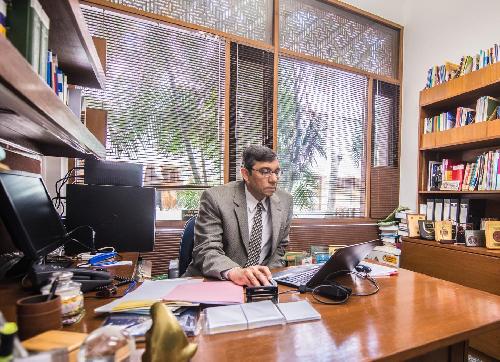Mother and child malnutrition in low- and middle-income countries encompasses a range of conditions including maternal wasting, micronutrient deficiencies, foetal growth restriction and stunting - a height that is below the World Health Organization Child Growth Standards median - of children younger than five years.
While the prevalence of stunting has decreased during the past two decades, it still affects 160 million children under 5 and is concentrated in South Asia and Sub-Saharan Africa.
"In shifting the global burden of stunting and growth retardation, it is important to address determinants such as poor status of women in society, gender disparities, and invest actively in promoting education and economic empowerment of girls," said Professor Zulfiqar A Bhutta, Founding Director, Centre for Excellence in Women and Child Health, Aga Khan University and Co-Director, SickKids Centre for Global Child Health in Toronto, Canada.
 In shifting the global burden of stunting and growth retardation, it is important to address determinants such as poor status of women in society, gender disparities, and invest actively in promoting education and economic empowerment of girls, said Professor Zulfiqar A Bhutta from the Aga Khan University and the SickKids Centre for Global Child Health. He was speaking as the lead speaker at a session on stunting at the 2016 Annual Meeting of the American Association for the Advancement of Science in Washington DC. Credit: Aga Khan University
In shifting the global burden of stunting and growth retardation, it is important to address determinants such as poor status of women in society, gender disparities, and invest actively in promoting education and economic empowerment of girls, said Professor Zulfiqar A Bhutta from the Aga Khan University and the SickKids Centre for Global Child Health. He was speaking as the lead speaker at a session on stunting at the 2016 Annual Meeting of the American Association for the Advancement of Science in Washington DC. Credit: Aga Khan University
He was speaking as the lead speaker at the session Childhood Stunting: Policy Solutions to Address a Global Burden with Long-Term Impacts at the 2016 Annual Meeting of the American Association for the Advancement of Science (AAAS) in Washington DC.
"The Aga Khan University is leading efforts to monitor nutrition and micronutrient deficiencies in Pakistan and the region, including Afghanistan. In addition, scientists and public health specialists at the University are engaged in testing and implementing innovations and low-cost solutions to addressing the problems of stunting and wasting among infants and children as well as adolescent girls in various settings," added Professor Bhutta.
Last year, the University also pledged to support the Global Strategy's ambitious yet achievable targets - which are fully aligned with the 17 Sustainable Development Goals - with an investment of over US$ 85 million to improve capacity and to develop programmes that will reach over 15 million women and children in South-Central Asia and East Africa, and potentially save a million lives.
Other speakers included Professor Andrew Prentice from the London School of Hygiene and Tropical Medicine, and Dr Shasha Jumbe from the Bill and Melinda Gates Foundation.
Professor Bhutta also participated as a discussant in another session The Global Impact of Violence Against Children: Economic, Health, and Policy Perspectives along with Professor Susan Horton from the University of Waterloo and other experts.
source: Aga Khan University